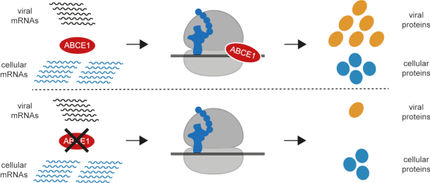How to inactivate common cold viruses
In the cold season, cold viruses are everywhere. But we can do something about it
Advertisement
There is something we can all do to prevent the common cold virus RSV from spreading: disinfecting hands and surfaces as well as gargling with mouthwash when symptoms occur.
Every year, respiratory syncytial viruses (RSV) cause countless respiratory infections worldwide. For infants, young children and people with preexisting conditions, the virus can be life-threatening. The team from the Department for Molecular and Medical Virology at Ruhr University Bochum has explored ways to reduce the risk of infection. Their findings show that – when used correctly – alcohol-based hand sanitizers and commercially available surface disinfectants provide good protection against transmission of the virus via surfaces. The research team reports in the Journal of Hospital Infection of 23 August 2023.
Some viruses are known to remain infectious for a long time on surfaces. To determine this period for RSV, the Bochum-based virology team examined how long the virus persists on stainless steel plates at room temperature. “Even though the amount of infectious virus decreased over time, we still detected infectious viral particles after seven days,” says Dr. Toni Luise Meister. “In hospitals and medical practices in particular, it is therefore essential to disinfect surfaces on a regular basis.” A test of five surface disinfectants containing alcohol, aldehyde and hydrogen peroxide showed that all cleaning agents inactivated the virus effectively on surfaces.
RSV is easier to render harmless than some other viruses
Likewise, hand sanitizers recommended by the WHO showed the desired effect. “An alcohol content of 30 percent was sufficient: we no longer detected any infectious virus after hand disinfection,” points out Toni Luise Meister. RSV is thus easier to render harmless than some other viruses, such as monkeypox virus or hepatitis B virus.
Still, most infections with RSV are transmitted from one person to another, via droplets from the air we breathe. The risk of contracting the virus from an infected person decreases if that person rinses their mouth for 30 seconds with a commercial mouthwash. The lab tests showed that three mouthwashes for adults and three of four mouthwashes designed specifically for children reduced the amount of virus in the sample to the point that the virus could no longer be detected.
“If we assume that these results from the lab can be transferred to everyday life, we are not at the mercy of seasonal flu and common cold, but can actively prevent infection,” concludes Toni Luise Meister. “In addition to disinfection, people should wash their hands regularly, maintain a proper sneezing and coughing etiquette, and keep their distance from others when they’re experiencing any symptoms.”





















































